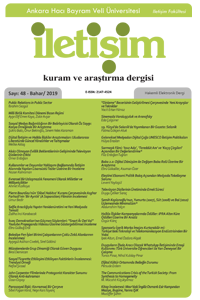Abstract
Bu çalışmada, yüz yüze ve sosyal medya üzerinde yapılan politik müzakerelerde katılımcıların güven davranışı üzerinden farklılıklar ve benzerlikler karşılaştırılmıştır. Bu karşılaştırma ile amaçlanan yüz yüze iletişim unsurlarının sanal gerçeklik denilen alanda tekrar edip etmediğini tespit etmektir. Değerlendirmeler için çalışmada, makro iktidar ve müzakerelerden ziyade mikro politik kamusal müzakerelere odaklanılmıştır. Böylelikle, müzakerelerde görülen baskılama ve dışlama unsurları tespit edilmiş, sosyal medyada yaşanan müzakerelerle karşılaştırması yapılmıştır. Katılımcılarla gerçekleştirilen yarı yapılandırılmış derinlemesine görüşmelerde, yüz yüze iletişim ve sosyal medya dolayımı ile gerçekleşen iletişim arasında ne gibi farkların olduğu tespit edilmeye çalışılmıştır. Çalışma sonucunda, katılımcıların kendi gerçek kişiliklerini yine sosyal medyaya taşıdıkları, ancak kimi makro nedenlerle güven duygusunun sosyal medyada daha az olduğu görülmüştür. Katılımcıların kendileri hakkındaki bilgilerinin sosyal medyada paylaşılmasının, gözetim uygulandığı hissini yarattığı ve yasal yaptırımlara daha kolay uğrayacakları düşüncesine yol açtığı tespit edilmiştir. Bu durum sosyal medya üzerinden yapılan müzakerelerde beklenen özgürlükçü potansiyelin artık yüz yüze iletişimin bile gerisine düştüğünün bir göstergesi olarak değerlendirilmektedir.
Keywords
References
- Beck, U., (1992). Risk society: Towards a new modernity. Sage.
- Blau, P. M., (1964). Exchange and power in social life. Transaction Publishers.
- Çoymak, A; Gheorghiu, MA; Niens, U; & Lyons, E; ( 2015).Vatandaşlığın Psikolojisi ve Politik Güven. İçinde Ö. Dirilen-Gümüş (Ed.), Siyaset Psikolojisi. (ss.257- 276). İstanbul: Nobel Yayınları.
- Giddens, A. (1990). Giddens, A. 1990. The Consequences of Modernity, Cambridge: Polity Press.
- Giddens, A. (2000). The third way and its critics. Cambridge: Polity Press.
- Habermas, J., (1997), Kamusallığın Yapısal Dönüşümü, T. Bora, M. Sancar (çev.), İstanbul: İletişim Yayınları.
- Lewis, J. D., & Weigert, A. J.(1985). Social atomism, holism, and trust. The Sociological Quarterly, 26 (4), 455-471.
- Luhmann, N. (2000). Familiarity, confidence, trust: Problems and alternatives. Trust: Making and Breaking Cooperative Relations, 6, 94 - 107.
- Marshall, G. (1999). Sosyoloji Sözlüğü, Ankara: Bilim Sanat Yayınları.
- Neuman, W. Lawrance, (2014a). Toplumsal Araştırma Yöntemleri Nitel ve Nicel Yaklaşımlar, Cilt 1, Ankara: Yayınodası Yayıncılık.
- Neuman, W. Lawrance, (2014b). Toplumsal Araştırma Yöntemleri Nitel ve Nicel Yaklaşımlar, Cilt 2, Ankara: Yayınodası Yayıncılık.
- Papacharissi, Z., (2002), “The Virtual Sphere: The Internet as a Public Sphere”, New Media and Society, S. 4, s. 9-27.
- Polat, R. K., (2005), “The Internet and Political Participation”, European Journal of Communication, S.20(4), s. 436-459.
- Wellman, B., (2001), “Does the Internet Increase, Decrease, or Sfupplement Social Capital?”, American Behavioral Scientist, S. 45, s. 436-455.
- Wilhelm, A. G., (1998), “Virtual Sounding Boards: How Deliberative is Online Political Discussion?”, İnformation, Communication and Society, S. 1, s. 313-338.
Abstract
In this study, the trust behaviors of the participants were compared in terms of differences and similarities in face-to-face communication and political negotiations on social media. The purpose of this comparison is to determine whether the elements of face-to-face communication repeat in the so-called virtual reality. The study focuses on micro-political public negotiations rather than macro-power and negotiations. Thus, the elements of suppression and exclusion observed in the negotiations were identified. It was compared with the negotiations on social media. In the semi-structured in-depth interviews conducted with the participants, it was tried to determine the differences between face-toface communication and communication on social media. As a result of the study, it was observed that the participants carried their real personalities to social media again, but for
some macro reasons, the sense of trust was less on social media. It was found that sharing information about the participants on social media caused them to feel that they were being supervised and that they would be subject to legal sanctions more easily. This situation is considered as an indicator that the expected libertarian potential in the negotiations on social media is now falling behind even face-to-face communication.
Keywords
References
- Beck, U., (1992). Risk society: Towards a new modernity. Sage.
- Blau, P. M., (1964). Exchange and power in social life. Transaction Publishers.
- Çoymak, A; Gheorghiu, MA; Niens, U; & Lyons, E; ( 2015).Vatandaşlığın Psikolojisi ve Politik Güven. İçinde Ö. Dirilen-Gümüş (Ed.), Siyaset Psikolojisi. (ss.257- 276). İstanbul: Nobel Yayınları.
- Giddens, A. (1990). Giddens, A. 1990. The Consequences of Modernity, Cambridge: Polity Press.
- Giddens, A. (2000). The third way and its critics. Cambridge: Polity Press.
- Habermas, J., (1997), Kamusallığın Yapısal Dönüşümü, T. Bora, M. Sancar (çev.), İstanbul: İletişim Yayınları.
- Lewis, J. D., & Weigert, A. J.(1985). Social atomism, holism, and trust. The Sociological Quarterly, 26 (4), 455-471.
- Luhmann, N. (2000). Familiarity, confidence, trust: Problems and alternatives. Trust: Making and Breaking Cooperative Relations, 6, 94 - 107.
- Marshall, G. (1999). Sosyoloji Sözlüğü, Ankara: Bilim Sanat Yayınları.
- Neuman, W. Lawrance, (2014a). Toplumsal Araştırma Yöntemleri Nitel ve Nicel Yaklaşımlar, Cilt 1, Ankara: Yayınodası Yayıncılık.
- Neuman, W. Lawrance, (2014b). Toplumsal Araştırma Yöntemleri Nitel ve Nicel Yaklaşımlar, Cilt 2, Ankara: Yayınodası Yayıncılık.
- Papacharissi, Z., (2002), “The Virtual Sphere: The Internet as a Public Sphere”, New Media and Society, S. 4, s. 9-27.
- Polat, R. K., (2005), “The Internet and Political Participation”, European Journal of Communication, S.20(4), s. 436-459.
- Wellman, B., (2001), “Does the Internet Increase, Decrease, or Sfupplement Social Capital?”, American Behavioral Scientist, S. 45, s. 436-455.
- Wilhelm, A. G., (1998), “Virtual Sounding Boards: How Deliberative is Online Political Discussion?”, İnformation, Communication and Society, S. 1, s. 313-338.
Details
| Primary Language | Turkish |
|---|---|
| Subjects | Communication and Media Studies |
| Journal Section | Research Articles |
| Authors | |
| Publication Date | June 28, 2019 |
| Submission Date | March 25, 2019 |
| Published in Issue | Year 2019 Issue: 48 |


